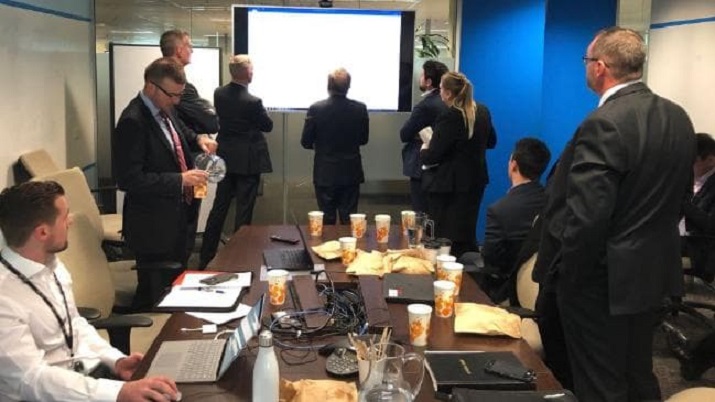Parliamentary committee’s track record fails on press freedom

Six AFP officers spent several hours going through more than 9000 documents seized during a wide-ranging raid. Picture: John Lyons ABC
The Government’s press freedom inquiry will only delay urgent changes needed to protect the role of journalists and whistleblowers.
After the Australian Federal Police raids of journalists last month, there is now ample evidence available that a raft of national security laws over the past decade have diminished press freedom in Australia, and these problems should be fixed immediately without going through the process of a long inquiry.
The terms of reference for the inquiry to be conducted by the Parliamentary Joint Committee on Intelligence and Security (PJCIS) are seriously flawed because they manifestly fail to address the need for whistleblower protection – the issue which has sparked the current concerns about press freedom in Australia. MEAA says an inquiry should be conducted in public with broad terms of reference to include all press freedom issues, including whistleblower protection and freedom of information.
The Opposition had also proposed a joint parliamentary inquiry but this failed to pass the Senate. At least this inquiry, while flawed, would have canvassed these critical issues.
MEAA chief executive Paul Murphy says: “The need for urgent amendments to existing laws is clear and well-known. Media organisations and other civil society groups have repeatedly pointed out the flaws in legislation that fail to adequately protect whistleblowers who seek to expose misconduct, fraud, corruption and threats to public health and safety. For years now, these flaws in national security laws have been told to politicians again and again. Holding yet another inquiry merely delays the necessary amendments that are required now.”
MEAA says it is particularly inappropriate having the PJCIS conduct a press freedom inquiry. “This committee has been informed repeatedly about the threats to whistleblowers and press freedom contained in some of the 75 national security laws passed by the Parliament since 2001. And almost without exception the committee has ignored these concerns or, at best, provided the merest band aid to deeply flawed laws. All the while, governments are classifying an increasing array of documents as secret when there is no justification for hiding that information from the community.
“The proof is in the current court actions directed at whistleblowers for telling the truth, coupled with the Australian Federal Police Force raids on a journalist’s home and the offices of the ABC in pursuit of whistleblowers. These issues that have been exposed by investigative journalists are clearly in the national interest and go to the heart of the public’s right to know what our governments are doing in our name. These actions against whistleblowers and the journalists they seek out to tell their stories demonstrate that there is a real crisis. Australia has gone down the path of pursuing and punishing truth-tellers,” he says.
Murphy adds: “The PJCIS inquiry cannot have credibility unless it recommends legislative changes to provide comprehensive protections for whistleblowers, an ongoing commitment to the public’s right to know through genuinely open and transparent government, and the decriminalisation of acts of journalism. Journalists should not go to prison for simply doing their job.
“If the government insists on such an inquiry, MEAA will participate and seek to appear as a witness. But it’s our firm belief that the issues and remedies are already well-known and it is urgent action by the Parliament that is needed now. This issue has sent shockwaves around the world - any delay to fixing the problem only continues to damage Australia’s reputation. It’s time that believing in press freedom is matched by action,” Murphy says.